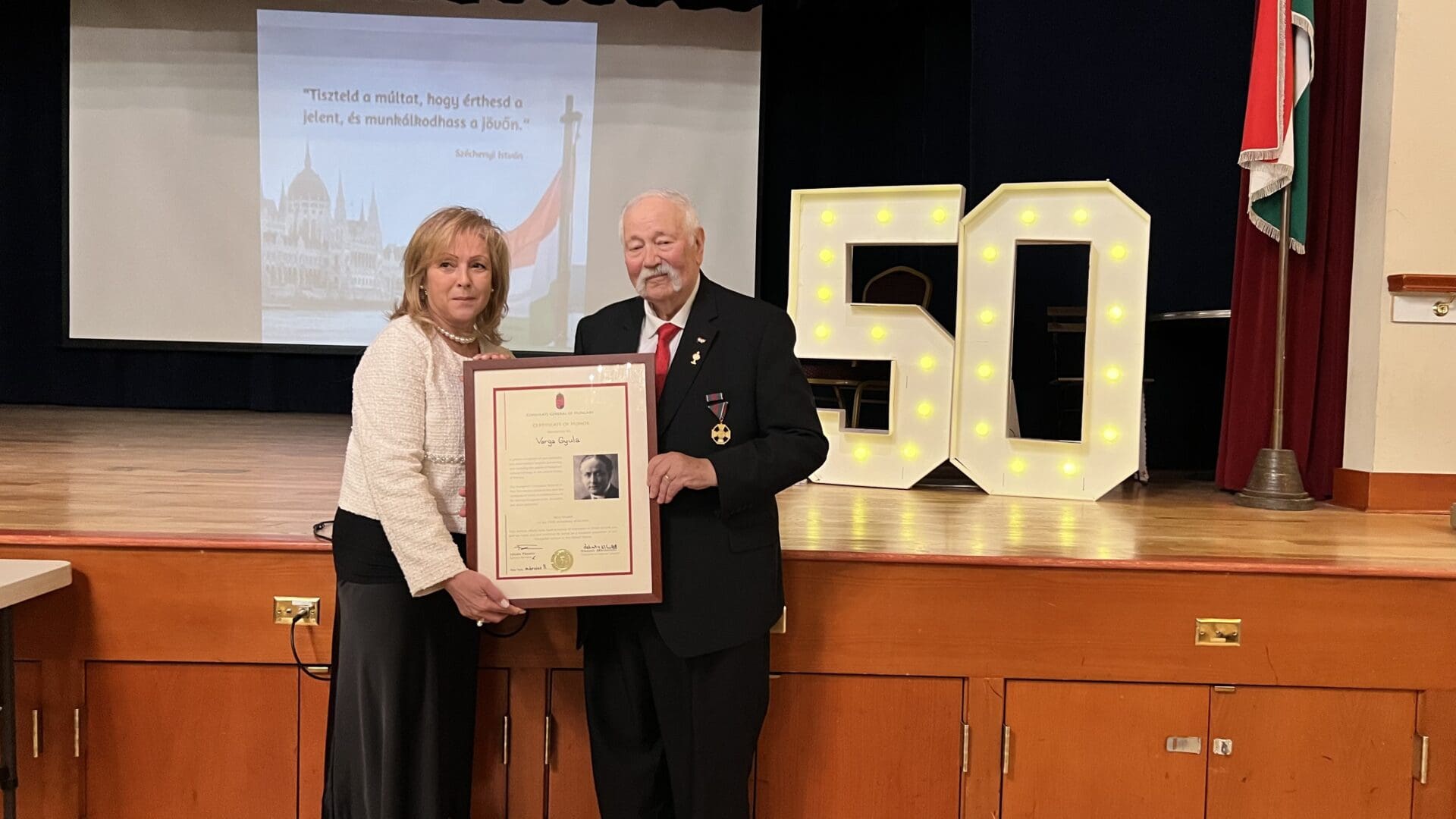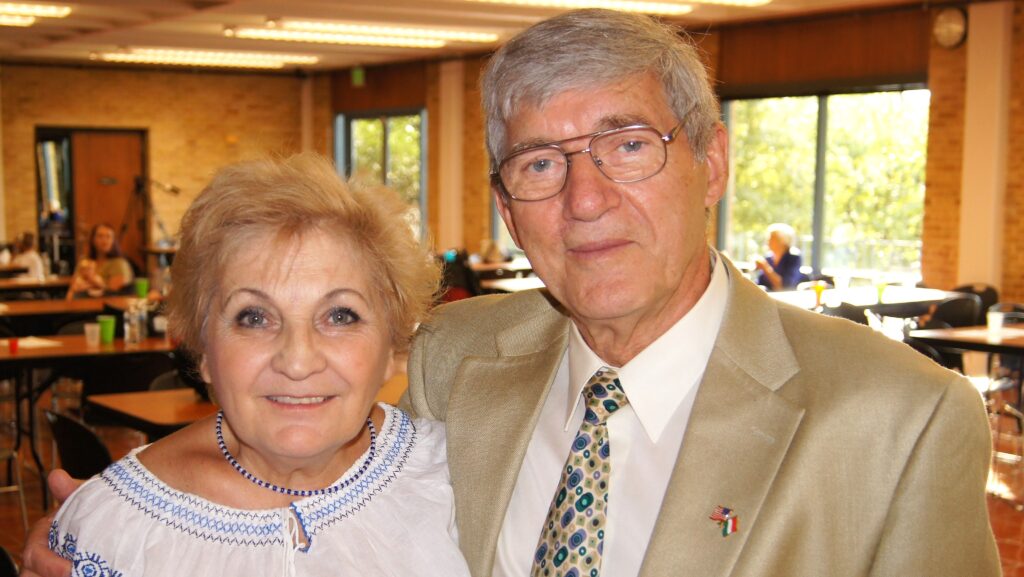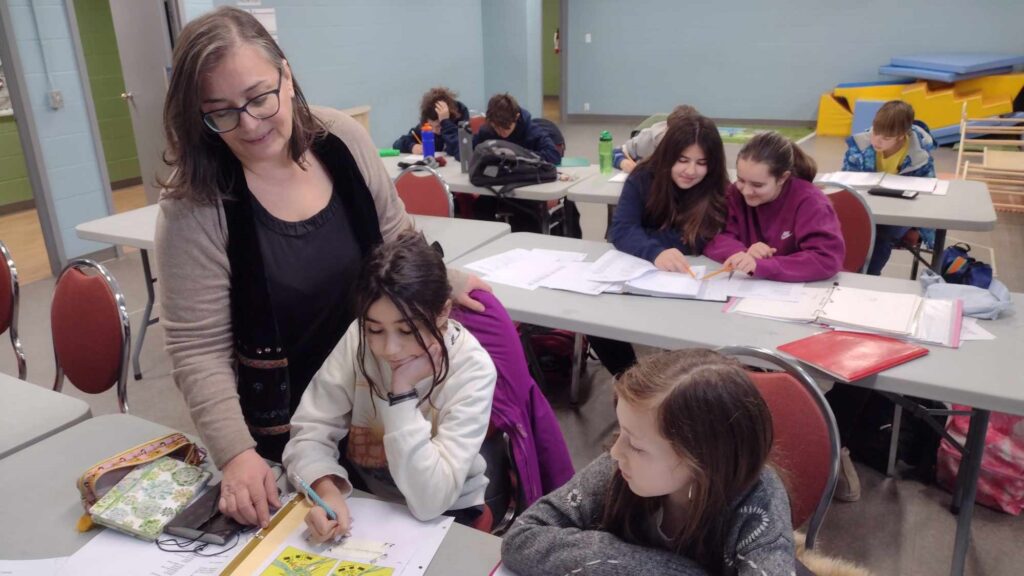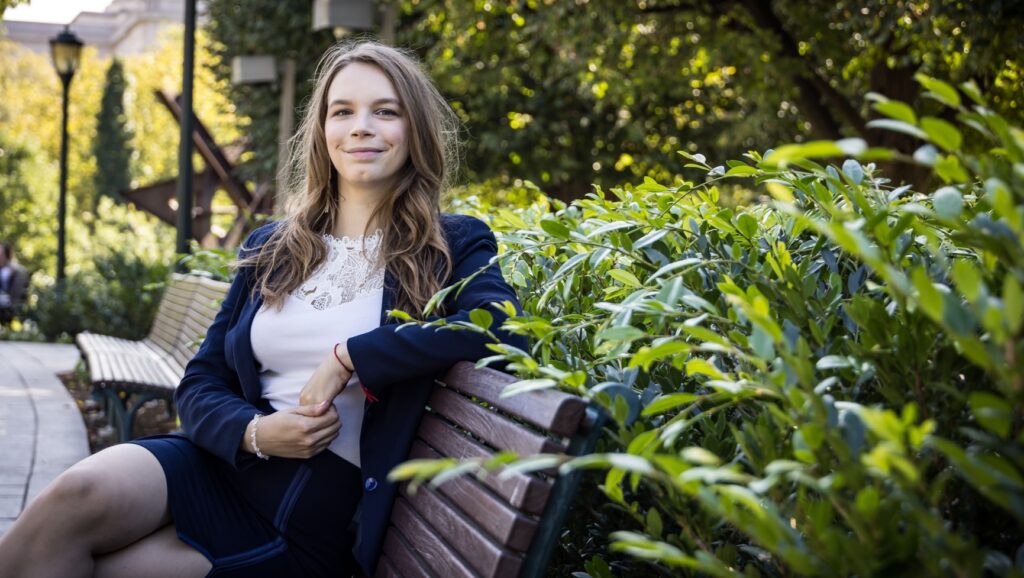The Széchenyi István Hungarian School and Kindergarten in New Brunswick (New Jersey) celebrated the 50th anniversary of its existence at the local Hungarian American Athletic Club (HAAC). The welcoming speeches were followed by an award ceremony, where former school principal Gyula Varga was awarded; a brunch; a storytelling musical performance by the local Fészer folk band and a theater performance by the Déryné Company from Hungary. The second part of the anniversary celebration will be held on 19 May, when the school’s students, teachers and parents will perform the musical adaptation of Zsigmond Móricz’s novel Be Faithful unto Death.
Current school principal Éva Mikucza, elected to the school council (parents’ working group) 10 years ago and its president for several years, had been the right-hand aid of her predecessor, Anna Róza Tóth for years, and when the latter resigned for family reasons last year, Éva was elected to work as principal. As she says, it was natural for her to continue the work Anna and she had started together years ago. In her welcome speech, she pointed out that the second part of the anniversary celebration will be the school’s theater performance on 19 May, when they will present the musical adaptation of Be Faithful unto Death, Zsigmond Móricz’s distinguished novel about human endurance, love and faith. She then welcomed Nikolett Szántovszki, Community Diplomat at the Hungarian Consulate General in New York, and the former principals of the school: Gyula Varga, dr. István Horváth, Zsolt Balla, János Gorondi, Ildikó Bézi and Károly Jakab, as well as Gyöngyvér Harkó, who started the poem recitation competition at the school twenty years ago. She thanked the local Hungarian organizations, without whom the school could not function; and finally welcomed the former and present teachers, mentioning their ‘determined efforts, creative thinking and development work, which made it possible to teach students in a modern way’.
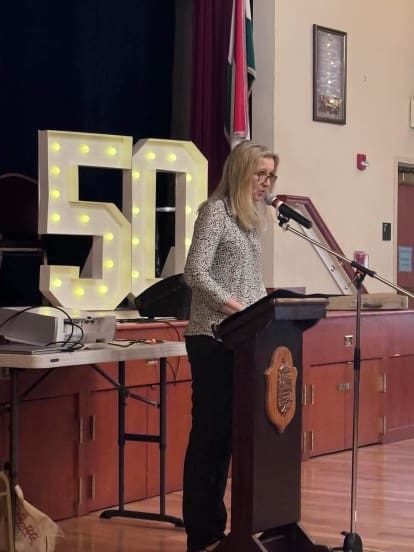
As she stressed, all of them have played a part in shaping the history of the school together, have been involved in overcoming difficulties and achieving successes, the key to which is continuous adaptation to the changing circumstances and requirements, and ‘a persistent, consistent and sometimes controversial work’. They have never believed that their work is flawless, but they have always believed that they are conscientious educators who have the best interests of their students at heart, she confessed, adding: the school has been providing quality education for 50 years to children of families who are committed to preserving the Hungarian language and culture, and who wish to maintain their language skills and learn about Hungarian history, culture and traditions. ‘Our aim is to preserve these values and pass them on, because this is our duty’, she concluded. Finally, she reminded us that the success of teaching Hungarian is based on the cooperation of families and schools. ‘Without the enthusiasm, hard work and dedication of parents to the Hungarian language and culture, this community would not exist. I know that they will do their best to ensure that our school continues to be successful in the future’. She concluded her speech with the words of István Széchenyi: ‘Who is with our Hungarian language, carries the life of our nation in his heart!’
In her speech, Community Diplomat Nikolett Szántovszki emphasized that the establishment of a Hungarian school and kindergarten in the US in the 1970s was not just an initiative, but ‘a dream in which the preservation of traditions and transmission of identity played an important role’. The school, she said, is the place where children learn what it means to be Hungarian, to have Hungarian roots, and where they participate in the institution’s community events on weekends, voluntarily and enthusiastically,
preserving and experiencing the treasure that Hungarian culture means to them.
This attitude and effort, she added, serves as an example to us on how to preserve our roots and cultural heritage.
‘In Hungary, the efforts of Hungarians living in the diaspora to pass on Hungarian culture and literature to younger generations are particularly appreciated and recognized. This communal effort unites and strengthens Hungarians worldwide and contributes to the revitalization and dissemination of Hungarian culture and language in the diaspora’, she concluded and thanked all those who have participated in this ‘blessed work’ and contributed to the success of the school. Finally, she presented the Certificate of Honor to Gyula Varga, the ‘Eternal Teacher’, who fifty years ago ‘dared to dream big’ and founded the Széchenyi Hungarian School and Kindergarten.
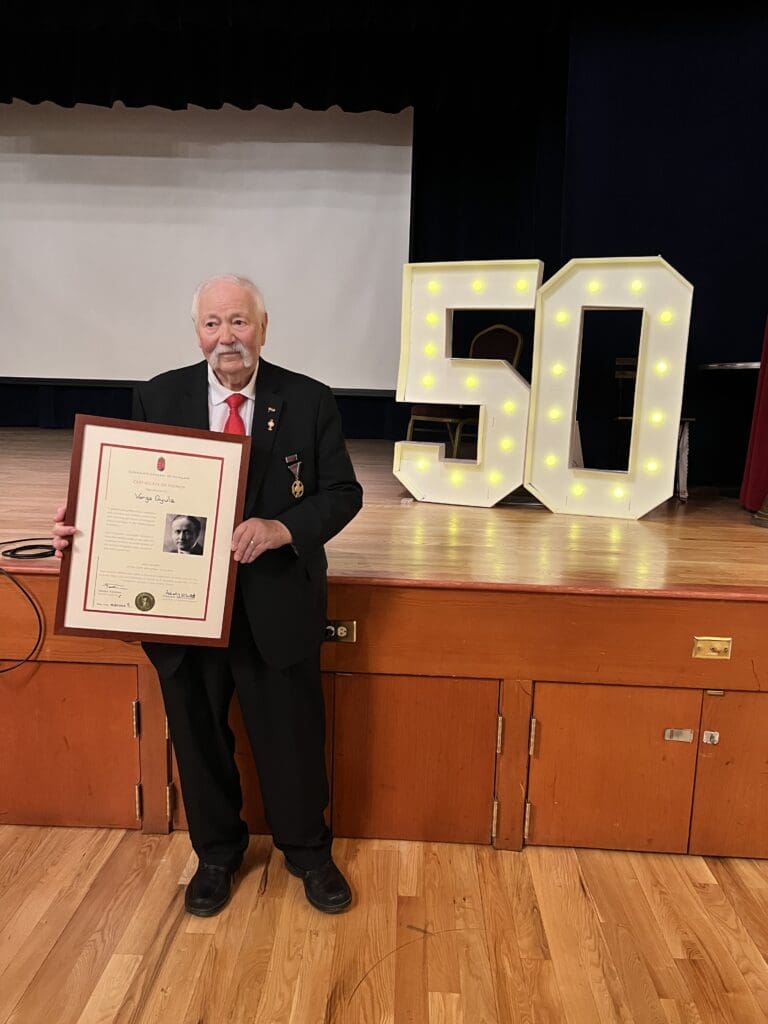
The 81-year-old 56er Gyula Varga thanked the certificate with his usual modesty and kindness, noting that he did not deserve it (nor the previous ones: the Hungarian Cross of Merit in 2021 and the American Hungarian Schools Meeting Award in 2022), as he had only done his duty. Then, with his characteristic honesty and openness, spoke about the school’s history, the challenges it had faced, and how the church, the Hungarian school and scouting used to work very closely together (which is unfortunately no longer the case). He briefly summarized the school’s history: in 1960 the Hungarian Alumni Association started a Hungarian Saturday school with two classes at Rutgers University, but it was discontinued in 1986 because of the lack of enough enrolling children. In the meantime, in 1971, Hungarian was introduced as an optional subject in some classes of the daily American school of St. Ladislaus Parish, and in the summer of 1973, the Hungarian Weekend School and Kindergarten Society was founded under the auspices of the Catholic and Reformed Churches and the local scout troops. The parallel operation of the two Hungarian schools was due to the stark political divisions within the emigration at the time whereby the Széchényi School took the position that they would not cooperate at any level with the communist government of Hungary.
In 1978, the scout leadership approached Gyula Varga with the aim of running the school in a religious and scout spirit, free of any divisive politics. He reorganized the school with youthful enthusiasm: he admitted it to membership of the Hungarian Scout Association in Exteris (KMCSSZ in Hungarian) and renamed it Széchenyi Hungarian School. Initially, the school was housed in the Hungarian Reformed Church, while the kindergarten was in a Plum Street building of the St. Ladislaus parish. Later, thanks to Father Máté Kiss, the entire school moved to the classrooms of the daily American school of St. Ladislaus, and the centralization made the school’s management much easier. As principal, Gyula Varga was in charge of the school’s organizational tasks on 30–32 Saturdays a year. He worked together with Gyula Pap (a survivor of seventeen years at the dreadful ‘Gulag’, referring to communist forced labor camps), a scout officer and Hungarian literature teacher. During their twenty years many changes took place: at first, the curriculum had to be ‘scraped together’, but after the change of regime in Hungary, it was much easier to obtain proper textbooks. At the beginning, many of the teachers were Hungarian educators and scout leaders, but by the mid-1990s, more and more teachers were getting tired and quitting, and the continuity of teaching was threatened every year. Over time, young generations of Hungarians joined the teaching team, and the school’s students increasingly became scout leaders, teachers, literary circle members, folk music and folk dance group leaders and members.
Gyula Varga also mentioned the establishment of the daily Hungarian kindergarten initially with seven children, including Gyula’s first son Gyuszi in 1975. The kindergarten closed in 1994 due to lack of demand, but under the leadership of the original founder Károlyné Balla’s daughter Enikő and granddaughter Réka Gorondi, it was relaunched as an independent institution called Aprókfalva Montessori Kindergarten, and it is still in operation. Gyula considers that the daily kindergarten was and still is of great importance because it lays a very good foundation for the development and education of children in their mother tongue, which has always been built upon by the Hungarian school. At the end of his speech, Gyula Varga drew attention to the diaspora interview booklet To Be Hungarian in America published last year, which he said should be on every Hungarian family’s bookshelf.
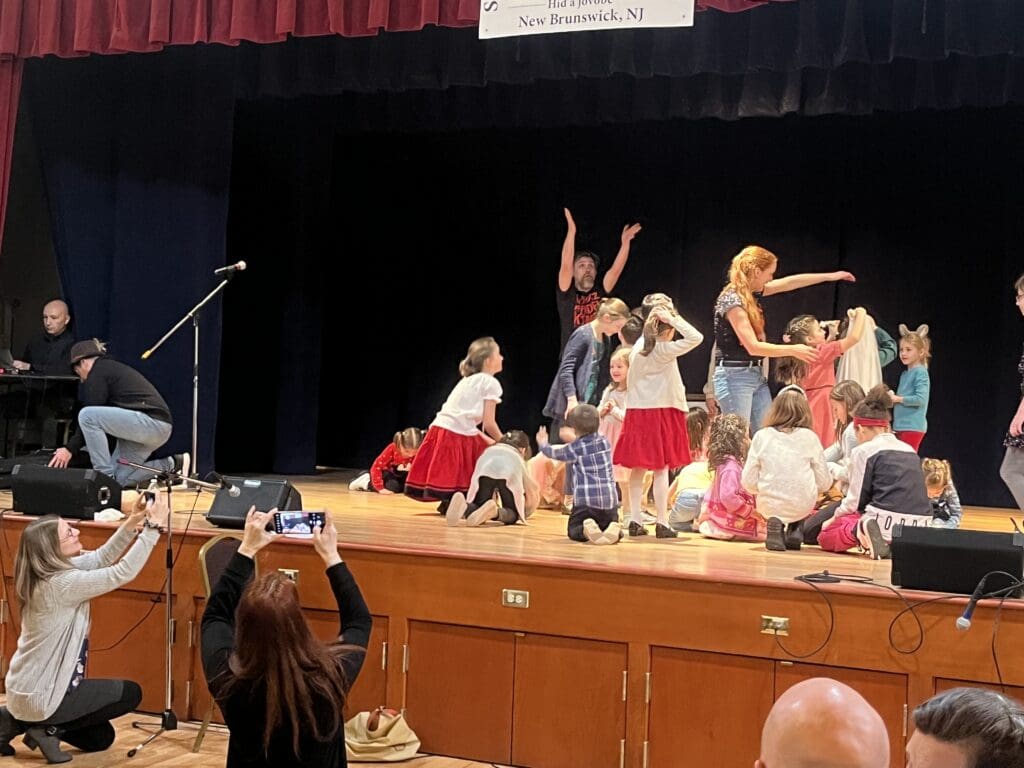
The welcoming speeches were followed by a brunch, an interactive storytelling by the local Fészer folk band, and finally a performance by the Déryné Company from Hungary. After the ceremony, I spoke to three former school principals. ‘More and more students are actively using their language skills to continue their university studies or take up jobs in Hungary. More and more young people born and trained in the US are finding their place in the local environment.
Hungarian American emigration is alive and well today.
Contrary to all the statistics, we continue to claim our national culture, language and ever-closer ties with the Old Country in our new homeland’, I quoted Gyula Varga from the 2003 yearbook. He commented: all these had taken a lot of fighting, and that fight must continue, because without young people who speak Hungarian well, who are educated in community spirit, who are self-sacrificing and take responsibility, there will be no one to take over the baton when the first generation is no longer there.
‘We can only prevent the process of assimilation with the full cooperation, work and support of the community. This is why I have always stressed that the linguistic and cultural education of young people should be made a priority for everyone, in their own interests, and not put on the shoulders of one–two obsessed, overworked, heroic, but persevering and treasured teachers or scout leaders. It should be supported and encouraged financially, morally and any other way by the whole community. Family, school, church, scouting—i.e. the joint commitment and joint efforts of parents, teachers, priests and youth leaders—can ensure our survival in the interests of our children and the Hungarian nation as a whole. Continue what we have started, because we do not want to get lost!’
Zsolt Balla took over the principal position from Gyula Varga in 1998 until 2001, and then again in 2004 after János Gorondi’s three-year term. He represented the younger generation, renewed and rejuvenated the teaching staff, formed a new governing body and successfully involved new parents.’It’s almost unbelievable. It seems like not so long ago we celebrated the 25th anniversary of the school. Since then, our children have grown up, the younger generation has come and brought their children to the Hungarian school and taught them and taken the school forward’, he confessed. He considered the anniversary celebration a real joyful occasion, where ‘the past met the present and we rejoiced together in our wonderful Hungarian school, where Hungarian education has been provided for half a century. We were all together at this event with people for whom the preservation and transmission of the Hungarian language and culture is an important task, out here in the great America. Who believe in not assimilating, but in mastering both Hungarian and American culture to a level that will serve as a bridge of understanding between the two nations.’ Like other speakers, Zsolt also stressed that it is not an easy task to maintain Hungarian culture in the New World.
‘Those who persistently develop and cultivate it, have to get up early also on Saturdays and sometimes travel hours to the school, then have to study hard subjects for which no university entrance score is awarded, ‘‘only’’ knowledge. But this is a wonderful knowledge based on the tradition of our parents, grandparents and ancestors. So for us, this knowledge has a special value. That’s why we try to preserve and pass it on to our children’, he concluded.
Dr. István Horváth first helped as Zsolt Balla’s occasional deputy to organize several shows, school graduation and poem recitation competitions in the school. He was deputy principal from 2004, and then principal until 2009 after Zsolt Balla’s move to Hungary in 2005. He said it is important to remind the community of the cost of maintaining institutions: for Hungarians living in the diaspora, it is a great effort and a great sacrifice for those who take it on. He quoted from his son’s words in the 2003–04 yearbook:
‘The Hungarian school is my life, which frees me from the rest of the world every Saturday morning.
Here I can only speak, write and study Hungarian with friends outside the home….The Hungarian language is a special treasure. Let us strive to speak Hungarian whenever we can. If we lose even this precious treasure, our Hungarian identity will be worth less.’
According to István, only the yearbooks and the students themselves can tell us what the Széchenyi Hungarian School and Kindergarten means to them. ‘When they send their children and grandchildren there, and they also join the school to teach or lead or work there, when they remember these times as a nice memory even in their old age, they do not abandon ‘‘the church and the school’’, and we can say: it was worth it.’

